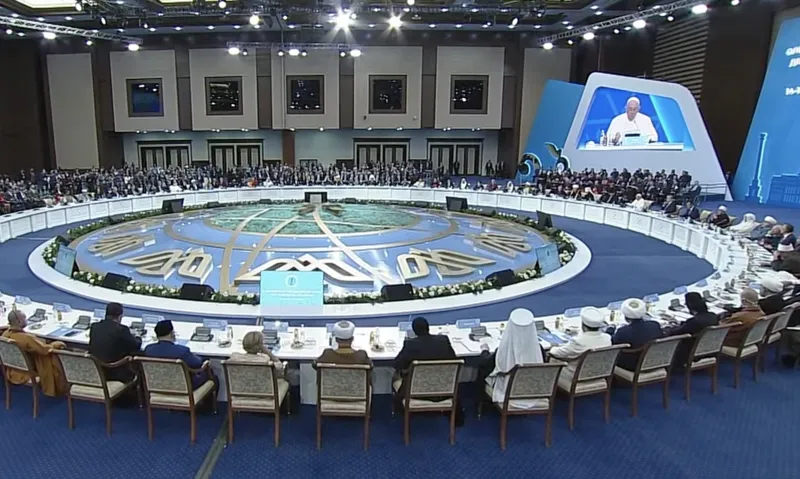
Rome Newsroom, Sep 15, 2022 / 04:07 am (CNA).
The interreligious congress in which Pope Francis participated this week in Kazakhstan adopted a declaration calling religious pluralism an expression “of the wisdom of God’s will in creation.”
The 35-point declaration was “adopted by the majority of the delegates” of the Seventh Congress of the Leaders of World and Traditional Religions Sept. 15 in the capital city of Nur-Sultan.
Pope Francis participated in the opening and closing ceremonies of the interreligious summit during his Sept. 13-15 visit to the Central Asian country.
Almost 100 delegates from around the world, representing the world’s major religions, participated in the three-day conference, including Vatican Secretary of State Cardinal Pietro Parolin and Cardinal Miguel Angel Ayuso Guixot, president of the Vatican’s Pontifical Council for Interreligious Dialogue.
Point 10 of the declaration said: “We note that pluralism and differences in religion, skin color, gender, race and language are expressions of the wisdom of God’s will in creation. Thus any incident of coercion to a particular religion and religious doctrine is unacceptable.”
The declaration also referenced the Document on Human Fraternity for World Peace and Living Together, signed by Pope Francis and Sheikh Ahmed Al Tayyeb, the grand imam of al-Azhar, in Abu Dhabi in February 2019.
“We recognize the importance and value of the Document on Human Fraternity for World Peace and Living Together between the Holy See and Al-Azhar Al-Sharif,” the Kazakhstan declaration said, adding that the document calls for “peace, dialogue, mutual understanding and mutual respect among believers for the common good.”
The declaration also condemned terrorism, called for an end to conflict “in all corners of our world,” and encouraged greater participation of women in religion and society.
“We proceed from the immutable fact that the Almighty created all people equal, regardless of their racial, religious, ethnic or other affiliation or social status, therefore tolerance, respect and mutual understanding underpin all religious teaching,” the declaration stated.
“We pay special attention to the importance of strengthening the institution of the family,” it said.
If you value the news and views Catholic World Report provides, please consider donating to support our efforts. Your contribution will help us continue to make CWR available to all readers worldwide for free, without a subscription. Thank you for your generosity!
Click here for more information on donating to CWR. Click here to sign up for our newsletter.





Families are the backbone of Planet Earth, our common home. May each family be blessed with strength, courage, a happy present, and a bright future.
A beautiful prayer. God bless you.
Re title of this article – I guess this is what Phil Lawler was on about the other day in Catholic Culture. (Sorry, I can’t re-find the article). I see Bishop (Arch?) Schneider, usually no slouch, also has reservations.
Religious pluralism.
Then why bother with the Catholic Church and its specific claims to Revelation and the truth?
Ramjet above – exactly.
At the World’s Congress of Religions (August 25 through October 15, 1893), which was concurrent with the World’s Columbian Exposition in Chicago, some 120 or more major papers were delivered. Of the over 100 presenters, seven were Catholic. Of these, Cardinal Gibbons (in his seven pages of small print) delivered a fraternal, and also forthright, and even modern address, including this:
“The religion of Christ imparts to us not only a sublime conception of God, but also a rational idea of man and of his relations to his Creator [….] The Gospel of Christ, as propounded by the Catholic church, has brought not only light to the intellect, but comfort also to the heart. It has given us ‘that peace of God which surpasseth all understanding”–the peace which springs from the conscious possession of the truth [….]
“The Catholic Church has taught man the knowledge of God and of himself [see Gaudium et spes, n. 22]; she has brought comfort to his heart by instructing him to bear the ills of this life with Christian philosophy [e.g., the later corpus of St. John Paul II]; she has sanctified the marriage bond [yes?]; she has proclaimed the sanctity and inviolability of human life from the moment that the body is animated by the spark of life till it is extinguished [timely!]; she has founded asylums for the training of children of both sexes and for the support of the aged poor; she has established hospitals for the sick and homes for the redemption of fallen women [or now, pro-life centers]; she has exerted her influence toward the mitigation and abolition of human slavery [and today’s sex trafficking]; she has been unwavering friend of the sons of toil [Rerum Novarum, 1891]. These are some of the blessings which the Catholic church has conferred on society.”
If possibly not a fitting focus from a guest to the interreligious congress in Kazakhstan, then surely some clear and non-generic reference points of the Faith, for fledgling superdicastery of Evangelization instituted as part of the current curial reform.
1) 1893. Why can’t we hear this today? Oh, sorry. Too triumphalist.
2) I think I was mistaken in thinking I had read an article by Phil Lawler on this notion of religious pluralism as God’s (active) will. I’ll have to go with just Bishop Schneider.
Jesus is the only way to Heaven!
Repent of your sins and turn to him as your Lord and Savior! We live in the end times.